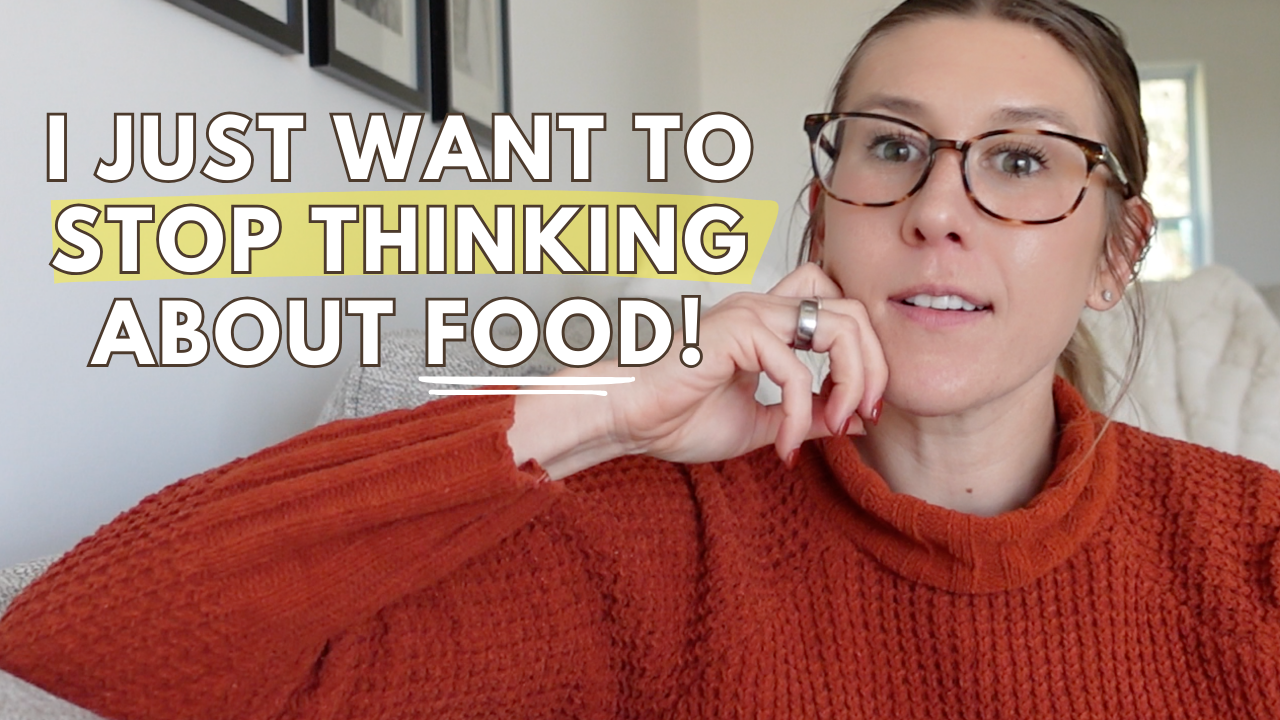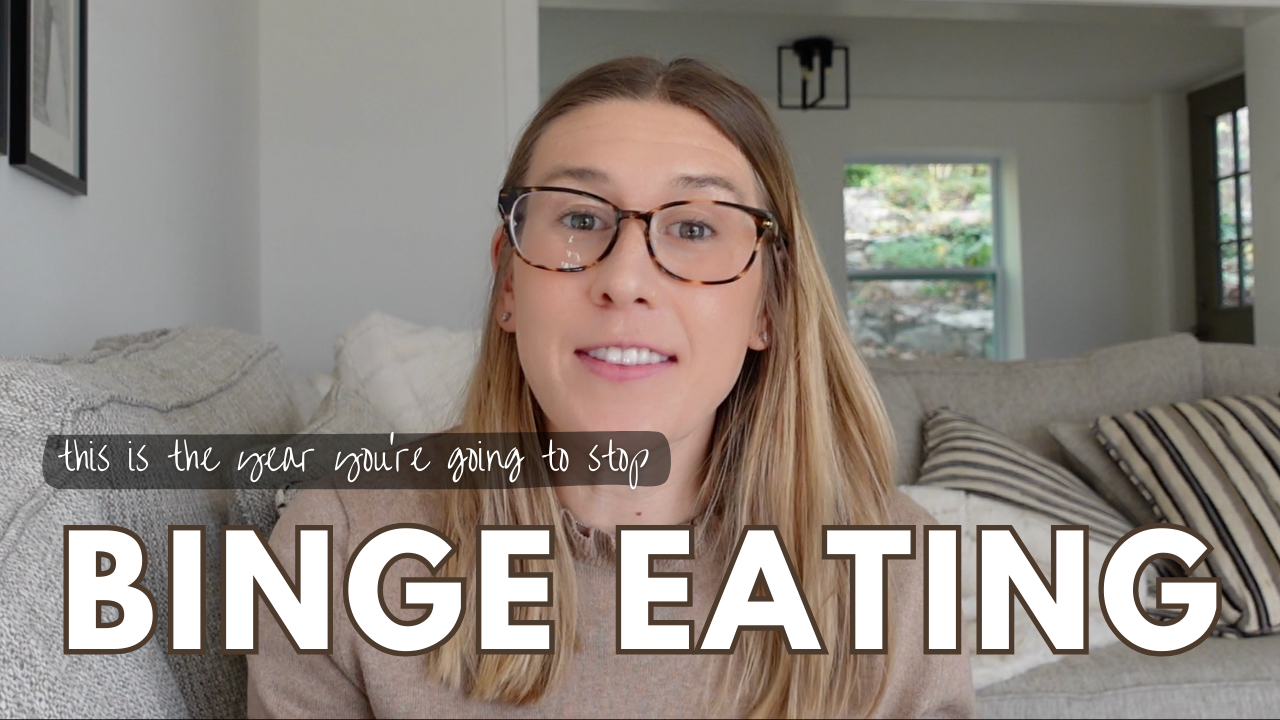Got really full? How to Navigate the Aftermath of Eating More Food Than Is Comfy
December 4, 2023

Hey There, I'm Ryann Nicole.
I’m a recovered binge eater who changed the story from something that happened to me to something that happened for me. Now, I’m a licensed therapist teaching you to do the same.
My mission? To help you ditch food stress and live your life with mental peace and freedom every single day!
Feeling really full after a big meal or binge is never fun. It happens, and it’s important to remember that shaming yourself for it doesn’t do anything to help. There’s no need to make this mean so much. Rather, let’s pause and practice caring for your body so you can ease the stomach ache and continue on with your day or night!
What To Do After Eating To Uncomfortably Full
If you ate beyond fullness and now feel uncomfortable, you didn’t do anything wrong. Try the following to help soothe your stomach:
Take a Moment to Pause and Breathe
Taking a moment to pause and breathe is like giving yourself a little break after eating. It’s the first thing you can do when you feel really full. Just stop for a moment and take a few big breaths.
Avoid Negative Self-Talk
Resist the urge to engage in self-criticism or negative self-talk. This means not saying mean things to yourself when you feel really full. Everyone gets that full feeling sometimes, and it doesn’t mean you’re not a good person. It’s important to be nice to yourself and know that feeling too full is something that happens to everyone.
Gentle Movement
Gentle physical activity can work wonders in alleviating discomfort and aiding digestion. Consider taking a short walk or doing some gentle stretches. But remember, don’t push yourself too hard, especially if you’re feeling extremely full.
Stay Hydrated
Hydrating is essential but do it slowly. Sipping water helps with digestion and can relieve that overly full feeling. Herbal teas like peppermint or ginger can be soothing for your stomach as well.
Learn from the Experience
Learning from the experience means not staying upset or feeling sorry about it but using it as an opportunity to take a deeper look at what happened. Instead of thinking about what went wrong, think of it as a helpful lesson.
Reach Out If Needed
If you notice that you are regularly eating to an overly full extent, it might be time to look at why this is happening. This might be a sign that more healing needs to happen with your relationship with food!
Remember, eating until you feel uncomfortably full is something many of us have gone through. Respond to it with self-compassion, understanding, and a commitment to caring for your body and well-being. By embracing mindful eating practices and learning from these experiences, you can cultivate a more balanced and nourishing approach to food.
10 Things To Add To Your Coping Box
Just so you know, I do review everything I recommend. When you buy through links on this page, we may earn a commission.
An emotional coping box, also known as a self-soothe or comfort box, is a personalized collection of items that can help individuals cope with difficult emotions, stress, or challenging situations. It’s a tangible and accessible resource that provides comfort and distraction during moments of distress. Here are 10 things you can consider adding to your emotional coping box:
Include items that bring you comfort, such as a soft blanket, stuffed animal, or cozy socks. These tactile objects can provide a sense of security and grounding.
Write down or print out affirmations and positive quotes that resonate with you. Reading these affirmations can help shift your mindset and promote self-compassion.
Incorporate items that engage your senses, such as scented candles, essential oils, or stress-relief lotion. Pleasant scents can have a calming effect.
Include small items like stress balls, fidget spinners, or textured toys. These can serve as a physical outlet for nervous energy and help redirect focus.
Keep a journal or notebook to write down your thoughts, feelings, and reflections. Journaling can be a therapeutic way to express and process emotions.
Include pictures of loved ones, happy memories, or items that hold sentimental value. Visual reminders of positive experiences can bring comfort and perspective.
Guided Relaxation or Meditation Resources
Include a small audio player or device with pre-loaded guided relaxation or meditation sessions. These can help you practice mindfulness and manage stress.
Playlist of Uplifting Music
Create a playlist of music that brings you joy or relaxation. Music has the power to influence mood, and having a go-to playlist can be a quick mood booster.
List of Coping Strategies
Write down a list of healthy coping strategies that work for you. This could include deep breathing exercises, progressive muscle relaxation, or simple activities that bring you a sense of peace.
Remember, the contents of your emotional coping box should be tailored to your preferences and needs. Regularly review and update the items to ensure they remain effective for you over time. The goal is to have a readily available toolkit that supports your emotional well-being during challenging moments.
check out the pod
Ways I Can Support You
01 Coaching
Intimate group coaching to break free from binge eating
02 podcast
Real talk on food, mindset shifts, motherhood, and finding peace.
03 support group
A safe space to connect with others on the same journey.
04 free coaching
Have real conversations and hear others share their struggles.
Ryann Nicole
Licensed Therapist, Certified Nutritionist, and Virtual Wellness Coach
Ryann is a licensed therapist and virtual wellness coach who has assisted individuals worldwide in establishing a healthier relationship with food and their bodies.
Are You Ready to Heal Your Relationship With Food?
I understand—it can be overwhelming to figure out where to begin. Let's simplify things and have you start right here:
Why Am I Overeating?
First Steps To Stop Binge Eating
The Ryann Nicole
Podcast
FREE QUIZ
FREE GUIDE
Podcast
the food freedom lab podcast




